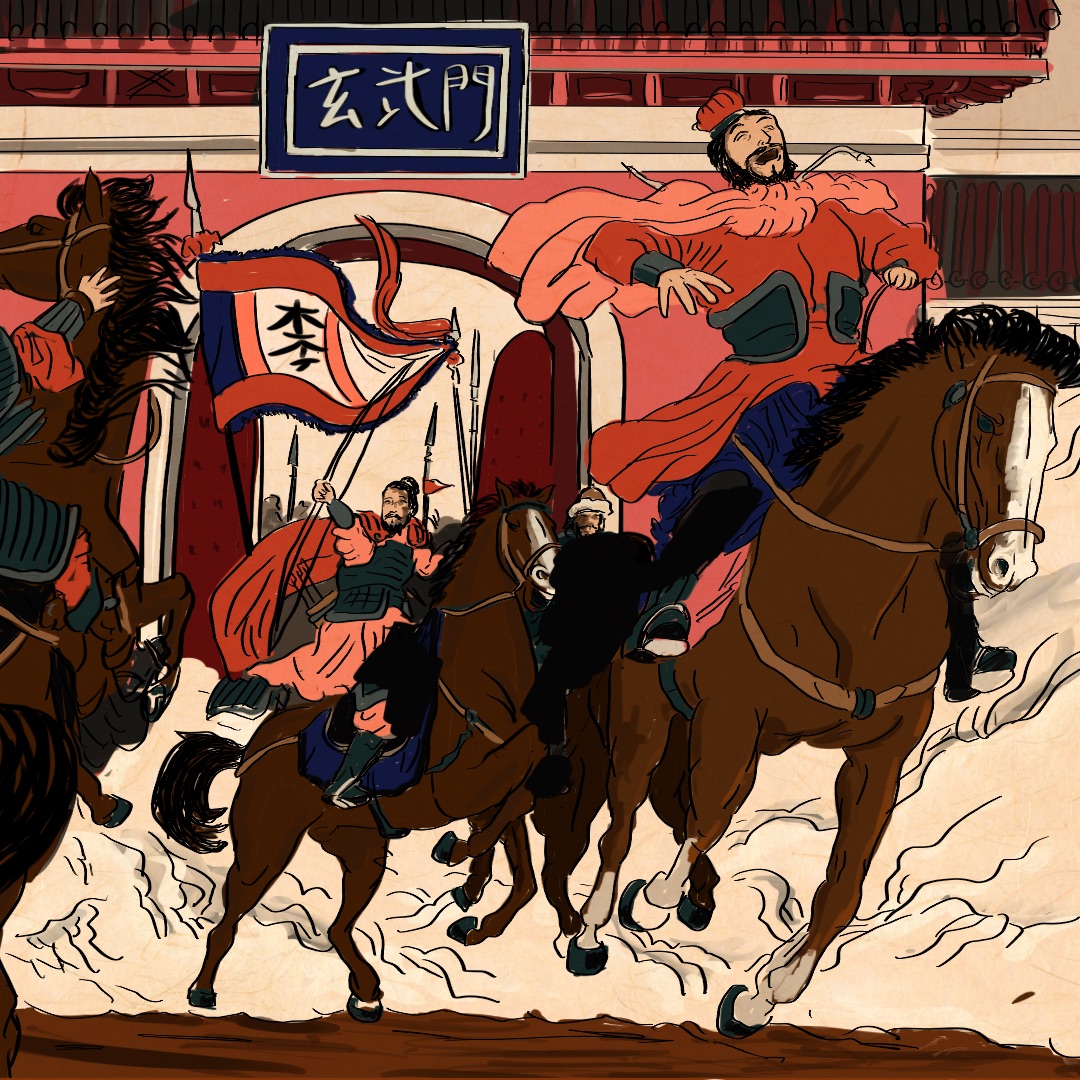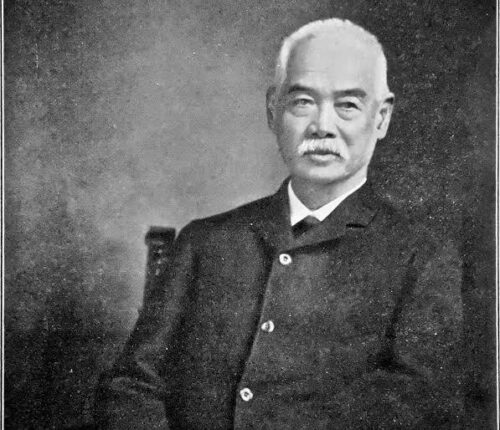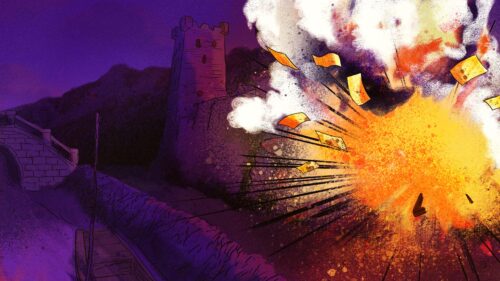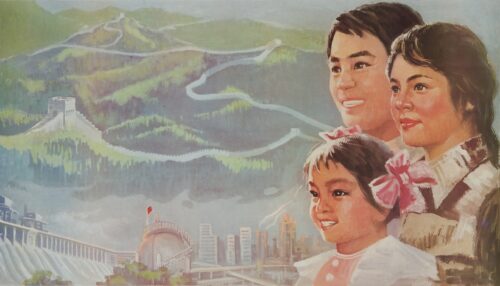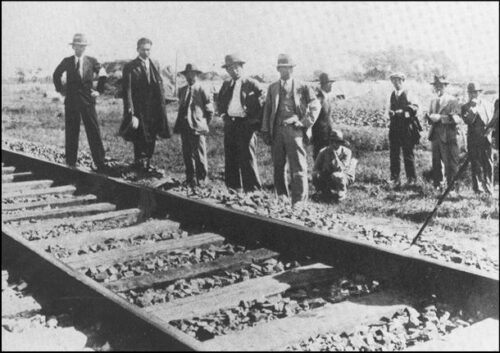This Week in China’s History: June 30, 626
At dawn on the 4th day of the 6th moon of the 9th year of the Wude reign — July 2, 626 by Western reckoning — two Tang princes rode toward the palace to meet with their father, Emperor Gaozu. Rumors had been flying around the capital, Chang’an, accusing these two men of both personal and professional misconduct, and the emperor would get to the bottom of it.
The entrance to the palace interior was through the Xuanwu Gate. As the two princes — Lǐ Jiànchéng 李建成, the heir apparent to the throne, and Lǐ Yuánjí 李元吉 — approached, they perceived that something was amiss. Troops loyal to and led by their brother, Lǐ Shìmín 李世民, were lying in ambush at the gate. Shimin had started rumors that his brothers had slept with their father’s concubines, as revenge for a series of plots and slights against him, and at this very moment, the rivalry was coming to a head.
In the account recorded by the Song historian Sīmǎ Guāng 司马光 and translated by UC Berkeley professor Woodbridge Bingham (the son of Yale historian Hiram Bingham, who is credited with rediscovering the Inca capital Machu Picchu), Jiancheng and Yuanji recognized the trap at the last moment and wheeled their horses to flee. Shimin killed the crown prince, Jiancheng, with an arrow as they fled. Yuanji managed to escape the palace into the woods, followed by some 70 of Shimin’s troops.
Li Shimin himself pursued his surviving brother into the forest, where tree branches knocked both men to the ground. Yuanji gained the upper hand as Shimin lay on the ground, the wind knocked out of him. But before Yuanji could take advantage, two of Shimin’s most loyal followers, Yùchí Jìngdé 尉遲敬德 and Qīn Shūbǎo 秦叔寶, arrived on the scene. Yuanji fled on foot a short distance before Jingde overtook and killed him.
For their loyalty and protection Yuchi Jingde and Qin Shubao, also known as Duke Zhongwu and Duke Zhuang, have been venerated ever since as Door Gods, protecting homes from evil spirits.
During the pursuit of Li Yuanji, a battle between supporters of the various princes continued for some time until Jingde and Shubao appeared with the heads of the two murdered princes, which they mounted on the Xuanwu Gate. Jingde then entered the palace and approached the emperor, who had spent the morning sailing on one of the lakes within his palace.
Bingham writes about the meeting of the two men, relayed from the Old Tang History (旧唐书 jiù táng shū), with the emperor asking in alarm, “Who is it that is disturbing the peace today? And why have you come here?” In reply, Yuchi Jingde stated that the heir apparent had disturbed the peace and that Li Shimin had been compelled to execute him. To avoid worrying the emperor, Yuchi Jingde was sent to guard him. Gaozu was given an offer he could not refuse.
The Gaozu emperor had founded what was to be China’s most powerful dynasty. His capital, Chang’an, was probably the world’s largest city, exceeded — only and perhaps — by Baghdad. Yet he now had few options: two of his sons were dead and the third now had a hostile army at the palace gates. Assessing the situation, Gaozu named Li Shimin his heir and two months later abdicated. Li Shimin ascended the throne as emperor Taizong.
Taizong went on to rule for 20 years, establishing himself as one of China’s most powerful and successful emperors. He became, after initial misgivings, a sponsor of Buddhism, welcoming the monk Xuanzang back from his “journey to the West” acquiring Sanskrit texts. He expanded the empire far into Central Asia, and he oversaw the production of a legal code that had far-reaching consequences, influencing Chinese legal thought and practice for centuries and shaping law codes in Vietnam, Korea, and Japan. Jack W. Chen, in his 2012 book The Poetics of Sovereignty, points out the lengths to which Taizong went to cultivate an image of himself as a virtuous ruler, a task enthusiastically taken up by subsequent generations of historians. In some accounts Taizong, rather than his father Gaozu, is the true founder of the Tang.
To be clear, Li Shimin/Taizong is not the only villain of this story. His brothers had conspired to murder their father as well. Antagonism among the brothers had persisted for years, and Li Jiancheng had influenced Gaozu against naming Li Shimin his heir despite evidence that he would have been the better choice. Yuanji had even resolved to murder Shimin, but had been stopped by the eldest brother (who instead gave Shimin an unruly horse in hopes that he would be thrown). When Jiancheng and Yuanji made their fateful trip to see the emperor on the morning of July 2, conspiracy against Shimin was almost certainly their goal. Nonetheless, it’s hard not to think that Taizong’s success was the fruit of a poisonous tree.
Not only did Taizong murder two of his brothers — one by his own hand — and overthrow his father’s reign, but earlier in life he manipulated his father into adultery against the Sui dynasty, compelling the rebellion that led to the creation of the Tang. The Shakespearean dimensions of Li Shimin’s life defy belief, and at the very least they call into question the idea of a just and moral ruler who built his reign on fratricide, treachery, and manipulation.
Some at the time had the same view. Historian Valerie Hansen points to a legend (translated into English by Arthur Waley in Ballads and Stories of Tun-huang) in which Taizong is summoned before the King of the Dead to account for his actions. In effect, Taizong’s anti-filial actions are pardoned, In her overview of Chinese history, The Open Empire, Hansen suggests that though “there were few checks on the emperor in this world…popular belief held that the dead could be tried in the courts of the afterlife.” The story translated by Waley was written down less than a century after the Xuanwu Gate coup, suggesting that very quickly, concerns were raised about the emperor’s behavior. A moral exemplar whose morals were far from exemplary.
This week, much of China’s historical energy is focused on the centennial of the Communist Party. There, too, we see an origin myth rearranged to fit subsequent developments. The 1921 National Congress of the Communist Party of China was just part of a complex foundation, staged (literally, if you visit the historical site in Xintiandi) to suggest that Máo Zédōng 毛泽东 — who was present but not central — led the Party from its inception. Mao famously admired Qin Shihuang, the first emperor of Qin, but he clearly learned some lessons from Tang Taizong.
This Week in China’s History is a weekly column.
